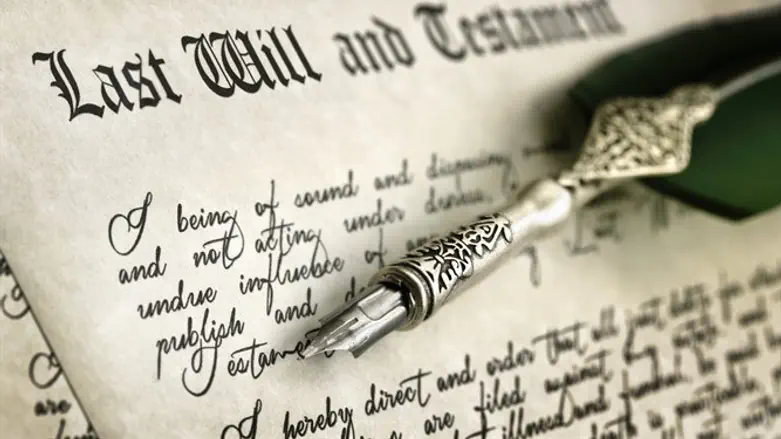
An elderly woman, rich in assets in banks and real estate, left only $4 to one of her children and all her possessions to her other son.
Members of the Rabbinical Court in Ariel, Rabbi Meir Freeman, Rabbi Meir Kahn, and Rabbi Yitzhak Rapaport were asked to deal with the conflict: The winning son asked that the will be upheld, while his brother filed an objection and asked that it be cancelled.
The woman, a teacher and librarian by profession, took her will extremely seriously, and wrote several versions that she would update from time to time. In the last version, written about a year-and-a-half ago, the woman left an original and valuable painting of the artist Abel Penn to one of her grandchildren, as well as valuable Stern jewelry to her niece.
She willed all her possessions to her younger son, while the eldest son was remembered for only four dollars. According to the detailed will, one percent of her property will be used for burial and commemoration expenses and the remainder of that one percent will go to charity. Together with the writing of the last will, she also willed the heirs their share.
The forsaken son claimed that his brother was the one who edited the will and that a person who benefitted from the will could not edit it.He noted that the mother was an expert Hebrew linguist and a literary woman with excellent writing ability.
According to him, if she needed help in drafting and editing, it was only because she had a stroke and was staying at the home of the winning heir.On that basis, the forsaken brother requested the annulment of the will.
The dayanim interrogated the boys at length and concluded that the will was made by the mother being of healthy and lucid mind, and indeed reflects the mother's wishes, since the mother's relationship with the son who was deprived has faded over the past few years.
The empty-handed son confirmed this, but claimed that he had expected and was told in the past that his mother would leave him his share of the inheritance to his son, the grandson of the deceased, who was very close to her. The winning son also confirmed this and said that indeed in a previous will she left property to her grandson, his nephew, but after the grandson left the country and broke her heart, she decided to exclude him as well.
After an in-depth examination of the facts and of the halachic sources, the dayanim decided to uphold the validity of the will, setting a precedent regarding the defect of the beneficiary of a will who took part in preparing the will. The court ruled that the defect exists only where there is a fear that the editor of the will deviated from the wishes of the deceased.
In the matter of the brothers' quarrel, despite the disconnection between them, they both agreed that the will accurately reflected the wish of their deceased mother. The son will receive only four dollars. And the second son will receive according to the will: The property, the rest of the money and assets left by the deceased, after it was proved that this was what she wanted.